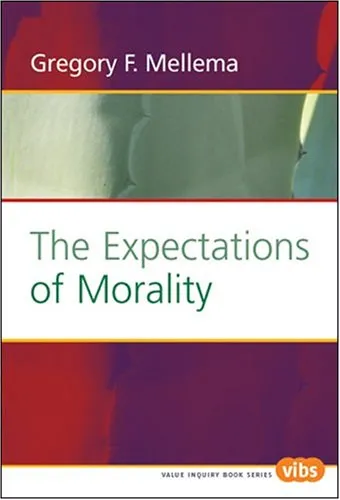The Expectations of Morality (Value Inquiry Book Series, 158)
4.0
بر اساس نظر کاربران

شما میتونید سوالاتتون در باره کتاب رو از هوش مصنوعیش بعد از ورود بپرسید
هر دانلود یا پرسش از هوش مصنوعی 2 امتیاز لازم دارد، برای بدست آوردن امتیاز رایگان، به صفحه ی راهنمای امتیازات سر بزنید و یک سری کار ارزشمند انجام بدینکتاب های مرتبط:
معرفی کتاب "The Expectations of Morality"
کتاب The Expectations of Morality از مجموعه Value Inquiry Book Series، جلد 158، یکی از آثار برجسته من در زمینه بررسی انتظارات اخلاقی و تأثیرات آنها بر رفتار و تصمیمات فردی در زندگی اجتماعی است. این کتاب درصدد است تا عمق بیشتری به فهم ما از انتظارات مرتبط با اخلاق بدهد و سوالات فلسفی بنیادین درباره نقش آنها در زندگی روزمره را مطرح کند.
خلاصهای از کتاب
تمرکز اصلی در کتاب The Expectations of Morality، تحلیل مفهوم توقعات و انتظارات در رابطه با اخلاق و وظایف اخلاقی است. موضوع اصلی این کتاب کاوش در این است که چگونه افراد جامعه از یکدیگر انتظار رفتار اخلاقی دارند و این توقعات چگونه به شکلدهی روابط انسانی کمک میکنند. من در این کتاب با رویکردی استدلالی، بین وظایف اخلاقی، مسئولیتهای اجتماعی، و نقش توقعات اخلاقی در تعیین هنجارهای اجتماعی ارتباط برقرار کردهام.
هدف از نگارش این کتاب، ارائه دیدگاهی روشن درباره انتظارات اخلاقی بهعنوان پدیدهای پیچیده و اثرگذار است. من به بررسی مسائل مهمی پرداختهام مانند اینکه چه چیزی باعث میشود انتظارات اخلاقی بر رفتار افراد حاکم شوند؟ آیا این انتظارات میتوانند موجه باشند یا همیشه جنبهای تحمیلگرایانه دارند؟ و چگونه میتوان کشمکشها و تضادها میان توقعات اخلاقی و حقوق فردی را تفسیر کرد؟
فصلهای کتاب به موضوعات مختلفی از جمله تحلیل مفاهیم moral responsibility، social norms، و تأثیر متقابل ارزشها و توقعات پرداختهاند. هدف نهایی این بوده است که مخاطب درک عمیقتری از ماهیت اخلاقیات و ارتباط آن با واقعیتهای روزمره حاصل کند.
نکات برجسته کتاب
- بررسی نقش توقعات اخلاقی در شکلدهی رفتارهای فردی و اجتماعی.
- تحلیلی دقیق از مفاهیمی مانند moral obligation و ethical accountability.
- ارائه دیدگاههایی کاربردی برای مواجهه با تنشهای هنجاری در جامعه.
- استفاده از مثالهای واقعی و مرتبط برای روشنسازی قدرت و پیچیدگی انتظارات اخلاقی.
نقلقولهای برجسته از کتاب
"Expectations of others are not merely signs of societal conformity, but mirrors reflecting our shared moral obligations."
"Moral expectations shape not only public behavior but also the internal moral compass of individuals."
"To understand morality is to understand the balance between societal expectations and individual autonomy."
چرا این کتاب اهمیت دارد؟
کتاب The Expectations of Morality برای هر کسی که علاقهمند به فلسفه اخلاق، جامعهشناسی، یا روانشناسی اجتماعی است، اهمیت بالایی دارد. این کتاب با ارائه چارچوبی روشن و علمی، به خوانندگان کمک میکند تا تأثیر توقعات اخلاقی بر جامعه و افراد را بهتر درک کنند. همچنین، این کتاب برای کسانی که میخواهند بهطور عملی با مسائل اخلاقی و اجتماعی پیچیده روبرو شوند، ابزارهایی فکری فراهم میکند.
از تأثیرهای انتظارات اخلاقی بر روابط شخصی گرفته تا اثرگذاری آن بر هنجارهای اجتماعی، این اثر به خوانندگان چشمانداز تازهای درباره اهمیت این موضوع میدهد. در عصر حاضر که بسیاری از جوامع با تضادها و کشمکشهای فرهنگی، اجتماعی و اخلاقی مواجه هستند، این کتاب بهعنوان راهنمایی برای درک بهتر چنین موضوعاتی جایگاه ویژهای دارد.
اگر به دنبال سفری فکری به دنیای ارزشها و توقعات اخلاقی هستید، کتاب The Expectations of Morality قطعاً میتواند به شما کمک کند تا پرسشهای عمیقتری درباره روابط انسانی و تأثیر اخلاق بر زندگی مدرن مطرح کنید.
Introduction to "The Expectations of Morality"
Morality shapes the foundation of human interactions, presenting itself as a dynamic spectrum of personal, social, and cultural expectations. In my book, "The Expectations of Morality", I delve deeply into the intricate relationship between the moral obligations we perceive and the expectations we impose on one another in diverse contexts. Part of the esteemed Value Inquiry Book Series, entry 158, this work is aimed at exploring complexities surrounding our moral choices, actions, and the weight of societal norms.
This book investigates how morality operates under a lens of varying expectations and explores the potential friction between individual autonomy and collective standards. As you journey through these pages, you will find in-depth discussions on responsibility, moral dilemmas, and the notion of voluntary and involuntary moral expectations. Let us now examine the key aspects that outline the book's structure and impact.
Detailed Summary of the Book
At its core, "The Expectations of Morality" examines a pivotal question: to what extent do moral obligations stem from the expectations individuals hold for one another within a society? The book begins by laying a philosophical foundation, exploring classical theories of morality and the role human interaction plays in shaping ethical behavior.
By dividing moral expectations into categories like voluntary and involuntary, the book provides readers with a nuanced understanding of how morality is both embraced and imposed. It investigates scenarios where conflicting moral obligations emerge—what happens when you're expected to conform to one societal norm that might contradict another? Through both hypothetical examples and real-world applications, the book examines moral failures, societal pressures, and the implications of meeting or failing expectations.
Additionally, discussions venture into the moral responsibilities attached to roles—whether as parents, employees, professionals, or community members. Finally, I aim to demonstrate how morality moves beyond mere compliance with rules and enters the domain of aspirational virtue.
Key Takeaways
- Morality often revolves as much around implicit expectations as explicit obligations.
- The dual categorization of moral expectations—voluntary and involuntary—determines how we respond to ethical scenarios.
- Moral conflicts arise when expectations overlap or contradict, challenging individuals to navigate these tensions with discretion and introspection.
- Societal roles come with a set of inherent expectations that influence our moral obligations.
- True morality goes beyond fulfilling external demands and evolves into a pursuit of ethical excellence.
These insights help readers frame their own understanding of morality, offering tools for analyzing their decisions and actions more critically.
Famous Quotes from the Book
"Moral responsibility is inevitably tied to the expectations we either embrace or fail to acknowledge in our relationships with others."
"The tension between what is expected of us and what we expect of ourselves is the crucible in which genuine morality is tested."
"To fulfill moral expectations is one thing; to aspire to values that transcend them is an altogether greater achievement."
Why This Book Matters
"The Expectations of Morality" is not just a theoretical inquiry into ethics; it is a practical guide for understanding real-world moral complexity. It provides readers who are philosophers, ethicists, and intellectually curious individuals with a roadmap to dissecting the expectations surrounding them.
Whether you're navigating personal relationships, workplace dynamics, or broader societal interactions, the concepts in this book encourage reflection, inspire moral growth, and emphasize the importance of aspiring toward ethical integrity. By focusing on the interplay of expectations and morality, this book offers both a philosophical framework and practical wisdom for anyone interested in navigating the evolving demands of contemporary society.
Morality is not static—it evolves alongside human relationships and institutions, and so must our understanding of it. This book provides the tools anyone needs to engage critically with the expectations that define our moral existence.
دانلود رایگان مستقیم
شما میتونید سوالاتتون در باره کتاب رو از هوش مصنوعیش بعد از ورود بپرسید
دسترسی به کتابها از طریق پلتفرمهای قانونی و کتابخانههای عمومی نه تنها از حقوق نویسندگان و ناشران حمایت میکند، بلکه به پایداری فرهنگ کتابخوانی نیز کمک میرساند. پیش از دانلود، لحظهای به بررسی این گزینهها فکر کنید.
این کتاب رو در پلتفرم های دیگه ببینید
WorldCat به شما کمک میکنه تا کتاب ها رو در کتابخانه های سراسر دنیا پیدا کنید
امتیازها، نظرات تخصصی و صحبت ها درباره کتاب را در Goodreads ببینید
کتابهای کمیاب یا دست دوم را در AbeBooks پیدا کنید و بخرید
1225
بازدید4.0
امتیاز50
نظر98%
رضایتنظرات:
4.0
بر اساس 0 نظر کاربران
"کیفیت چاپ عالی بود، خیلی راضیام"
Questions & Answers
Ask questions about this book or help others by answering
No questions yet. Be the first to ask!



